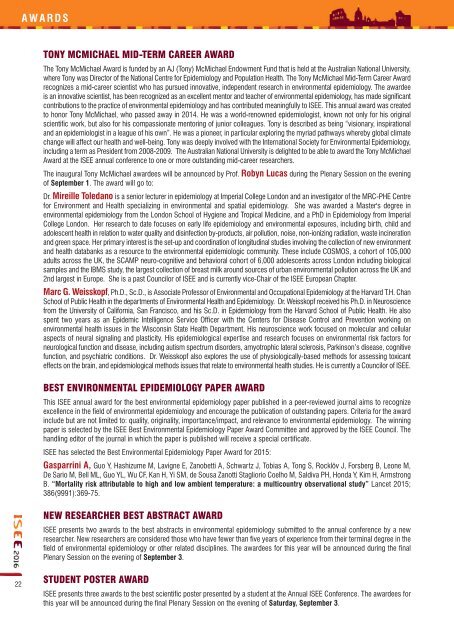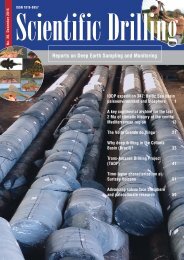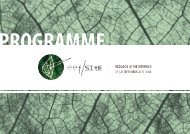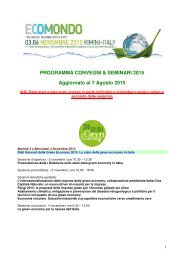Rome Italy
program-bookISEE2016
program-bookISEE2016
Create successful ePaper yourself
Turn your PDF publications into a flip-book with our unique Google optimized e-Paper software.
AWARDS<br />
TONY MCMICHAEL MID-TERM CAREER AWARD<br />
The Tony McMichael Award is funded by an AJ (Tony) McMichael Endowment Fund that is held at the Australian National University,<br />
where Tony was Director of the National Centre for Epidemiology and Population Health. The Tony McMichael Mid-Term Career Award<br />
recognizes a mid-career scientist who has pursued innovative, independent research in environmental epidemiology. The awardee<br />
is an innovative scientist, has been recognized as an excellent mentor and teacher of environmental epidemiology, has made significant<br />
contributions to the practice of environmental epidemiology and has contributed meaningfully to ISEE. This annual award was created<br />
to honor Tony McMichael, who passed away in 2014. He was a world-renowned epidemiologist, known not only for his original<br />
scientific work, but also for his compassionate mentoring of junior colleagues. Tony is described as being “visionary, inspirational<br />
and an epidemiologist in a league of his own”. He was a pioneer, in particular exploring the myriad pathways whereby global climate<br />
change will affect our health and well-being. Tony was deeply involved with the International Society for Environmental Epidemiology,<br />
including a term as President from 2008-2009. The Australian National University is delighted to be able to award the Tony McMichael<br />
Award at the ISEE annual conference to one or more outstanding mid-career researchers.<br />
The inaugural Tony McMichael awardees will be announced by Prof. Robyn Lucas during the Plenary Session on the evening<br />
of September 1. The award will go to:<br />
Dr. Mireille Toledano is a senior lecturer in epidemiology at Imperial College London and an investigator of the MRC-PHE Centre<br />
for Environment and Health specializing in environmental and spatial epidemiology. She was awarded a Master's degree in<br />
environmental epidemiology from the London School of Hygiene and Tropical Medicine, and a PhD in Epidemiology from Imperial<br />
College London. Her research to date focuses on early life epidemiology and environmental exposures, including birth, child and<br />
adolescent health in relation to water quality and disinfection by-products, air pollution, noise, non-ionizing radiation, waste incineration<br />
and green space. Her primary interest is the set-up and coordination of longitudinal studies involving the collection of new environment<br />
and health databanks as a resource to the environmental epidemiologic community. These include COSMOS, a cohort of 105,000<br />
adults across the UK, the SCAMP neuro-cognitive and behavioral cohort of 6,000 adolescents across London including biological<br />
samples and the IBMS study, the largest collection of breast milk around sources of urban environmental pollution across the UK and<br />
2nd largest in Europe. She is a past Councilor of ISEE and is currently vice-Chair of the ISEE European Chapter.<br />
Marc G. Weisskopf, Ph.D., Sc.D., is Associate Professor of Environmental and Occupational Epidemiology at the Harvard T.H. Chan<br />
School of Public Health in the departments of Environmental Health and Epidemiology. Dr. Weisskopf received his Ph.D. in Neuroscience<br />
from the University of California, San Francisco, and his Sc.D. in Epidemiology from the Harvard School of Public Health. He also<br />
spent two years as an Epidemic Intelligence Service Officer with the Centers for Disease Control and Prevention working on<br />
environmental health issues in the Wisconsin State Health Department. His neuroscience work focused on molecular and cellular<br />
aspects of neural signaling and plasticity. His epidemiological expertise and research focuses on environmental risk factors for<br />
neurological function and disease, including autism spectrum disorders, amyotrophic lateral sclerosis, Parkinson’s disease, cognitive<br />
function, and psychiatric conditions. Dr. Weisskopf also explores the use of physiologically-based methods for assessing toxicant<br />
effects on the brain, and epidemiological methods issues that relate to environmental health studies. He is currently a Councilor of ISEE.<br />
BEST ENVIRONMENTAL EPIDEMIOLOGY PAPER AWARD<br />
This ISEE annual award for the best environmental epidemiology paper published in a peer-reviewed journal aims to recognize<br />
excellence in the field of environmental epidemiology and encourage the publication of outstanding papers. Criteria for the award<br />
include but are not limited to: quality, originality, importance/impact, and relevance to environmental epidemiology. The winning<br />
paper is selected by the ISEE Best Environmental Epidemiology Paper Award Committee and approved by the ISEE Council. The<br />
handling editor of the journal in which the paper is published will receive a special certificate.<br />
ISEE has selected the Best Environmental Epidemiology Paper Award for 2015:<br />
Gasparrini A, Guo Y, Hashizume M, Lavigne E, Zanobetti A, Schwartz J, Tobias A, Tong S, Rocklöv J, Forsberg B, Leone M,<br />
De Sario M, Bell ML, Guo YL, Wu CF, Kan H, Yi SM, de Sousa Zanotti Stagliorio Coelho M, Saldiva PH, Honda Y, Kim H, Armstrong<br />
B. “Mortality risk attributable to high and low ambient temperature: a multicountry observational study” Lancet 2015;<br />
386(9991):369-75.<br />
NEW RESEARCHER BEST ABSTRACT AWARD<br />
ISEE presents two awards to the best abstracts in environmental epidemiology submitted to the annual conference by a new<br />
researcher. New researchers are considered those who have fewer than five years of experience from their terminal degree in the<br />
field of environmental epidemiology or other related disciplines. The awardees for this year will be announced during the final<br />
Plenary Session on the evening of September 3.<br />
22<br />
STUDENT POSTER AWARD<br />
ISEE presents three awards to the best scientific poster presented by a student at the Annual ISEE Conference. The awardees for<br />
this year will be announced during the final Plenary Session on the evening of Saturday, September 3.





